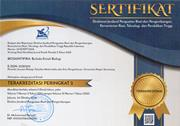Penurunan Jumlah dan Motilitas Spermatozoa Setelah Pemberian Ekstrak Biji Pepaya (Kajian Potensi Biji Papaya sebagai Bahan Kontrasepsi Alternatif) The Declining of Spermatozoa Number and Motility of Mice Were Treats with Papaya Seeds Extract
(1)
Abstract
Organs of many plants have been used as male contraception materials. One of the organs is papaya seed. This seed contains carpain, a molecule that could cause vacuole initiation on Sertoli cell. The research aimed to know whether papaya seed carpain affects mice spermatozoa quality. This research is an experimental one that makes use of 24 male mice. These mice are separated into 4 groups. Each group has its own papaya seed extract doses. The first group is the mice group that is given by doses of 0 mg/200 gr body weights. And the following groups are 10 mg/200 gr body weight for group II, 20 mg/200 gr body weight for group III, and 40 mg/200 gr body weight for group IV. Oral supplement of the papaya seed is 1 ml/mouse/day in the term of 40 days. These oral supplement is followed by reversibility time for 40 days. The data consist of spermatozoa viability, motility, and amount. These data are analyzed by 2 x 4 factorial analysis in the test scale of 5%. Statistical analysis shows significant differences among each treatment (8.27 > 2.76), spermatozoa taking time (5.81 > 4.60) and dose variation among groups (15.29 > 3.34). There are also significant differences among motility treatment (24.94 > 2.76), time (4.66 > 4.60) and doses (55.03 > 3.34). There is no significant difference among viability (3.22 < 3.74) nor treatment (2.30 < 2.76). The research concluded that papaya seed extract affects the spermatozoa motility and the decrease of spermatozoa numbers, but not to the reversibility and the viability.
Keywords: contraception, papaya seed, reversibility
Full Text:
PDFRefbacks
- There are currently no refbacks.

This work is licensed under a Creative Commons Attribution 4.0 International License.


